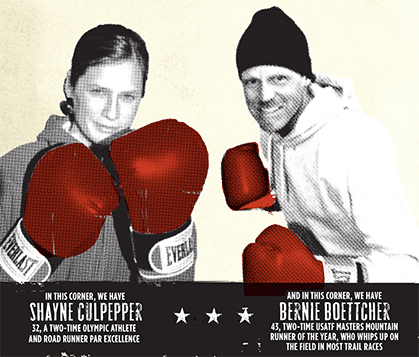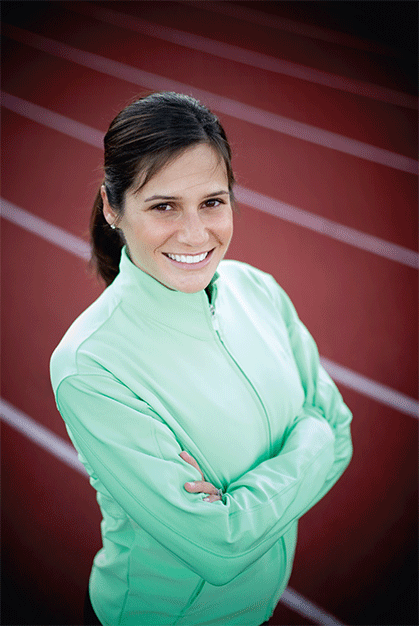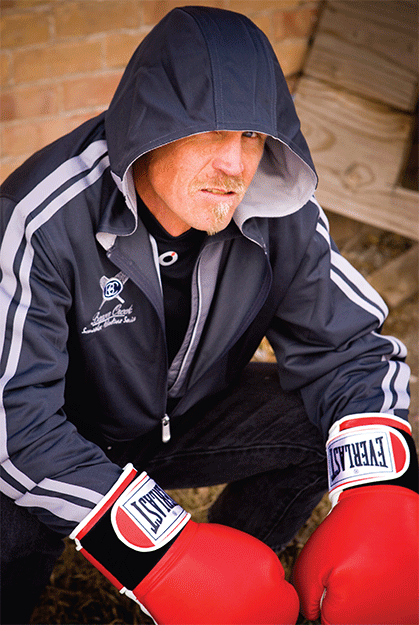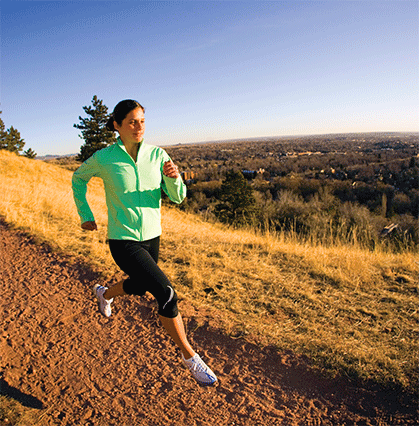New perk! Get after it with local recommendations just for you. Discover nearby events, routes out your door, and hidden gems when you sign up for the Local Running Drop.
Champions of the trail and road duke it out. Which sport wins?

Photo by David Clifford.
The Contenders:

Photo by David Clifford
“SMOKIN’” SHAYNE CULPEPPER
Hometown: Lafayette, Colorado
Age: 32
Height: 5’5″
Racing Weight: 112
Peak training mileage: 65 mpw
Specialty: Middle distance. Flat and (very) fast. Track and roads.
Top Races and KOs:
- 2004 Olympic Trials 5K Champion (15:07)
- Two-time Olympian
- 2004 World Indoors 3K bronze medalist
- Two-time U.S. Indoor 3K Champion
- 800M PR of 2:02, 5K PR of 15:01

Photo by David Clifford.
“KILLER B” BERNIE BOETTCHER
Hometown: Silt, Colorado
Age: 43
Height: 5’11”
Racing Weight: 148
Peak training mileage: 116 mpw
Specialty: Runs weekly races (60 of them in 2006) and wins a majority of them. A technical, downhill trail-running ace.
Top Races and KOs:
- 2003, 2005 USATF Masters Mountain Runner of the Year.
- 2003, 2004, 2005 North American Masters Snowshoe Champion
- 2004, 2005 Trail Runner Trophy Series Masters Champion
- 2003 USATF Masters 10K Trail Champion
- 2004 Colorado USATF Masters Marathon Champion
True or False? Road runners are too focused on speed. They are obsessed with split times and don’t stop to smell the roses.
Shayne Culpepper: False. If a road runner or any distance runner focuses too much on speed, their career will be shortened by injury or burn-out. While road runners do focus more on times and splits, that doesn’t mean that they don’t or shouldn’t stop to smell the roses. On the other hand, that does not mean you need to pack a picnic lunch on your next run.
Bernie Boettcher: If you never run fast, you’ll never run fast. It’s the same for trails as it is for roads. I do most of my speedwork on trails, over varied terrain, through beautiful places. I don’t need to stop to smell the roses. Trail running IS the roses. The air may be thick with vapors from a waterfall, or musty from wet leaves, or sappy like a pine forest, or pungent with sage, or fishy along a lakeshore. It’s all a bouquet of roses to me.
True or False? Trail runners are hopeless romantics and aren’t as competitive as road runners.
BB: True AND False. The hopeless romantic will dare to try the impossible. The hopeful realist wishes him luck, but goes back to his steady job. The hopeless romantic never gives up trying. The hopeful realist, well, he tries, but knows when to quit. I’d rather be a hopeless romantic.
Trail running is a much more free-spirited interpretation of running than road running. The preoccupation with love, the celebration of nature, the often impractical desire to run in remote places that can flood your senses like a fine tequila …it’s all pretty romantic stuff.
As far as being competitive, trail runners ROCK! A strong desire to compete locally, nationally and globally has been the primary focus of many trail runners. In Europe, we are revered, and it’s finally catching on in the U.S. The only thing we lack is an Olympic event.
SC: The hopeless romantic will dare to try the impossible, and more often end up with a twisted ankle, or an afternoon lost in the woods with West Nile-biting mosquitoes. The hopeful realist wishes him luck, and comes up with a meticulous training plan, more often resulting in success.
The hopeless romantic never gives up trying, and then wonders why he’s injured, and why his wife forgot his name. The hopeful realist, he tries, but keeps running in perspective. He knows when to cut out those extra miles to maintain his health and sanity.
I am going with the hopeful realist. Plan and execute. Set the bar high, and rise to the occasion. Like collecting seashells, there is a reason trail running is not in the Olympics.
True or False? Trail runners are slow-footed plodders.
BB: True. Some trail runners are slow-footed plodders, because they spend too much time running on the road. The ability to accelerate down rock-strewn trails comes from practicing on rock-strewn trails. Just because your ankles start looking more like a tree trunk than a twig doesn’t mean you’re slow. It means you’ve adapted to the terrain. It means you can run up a mountain, stand at the top of a scree-filled couloir, and smile at the prospect of descending faster than your state champion can run on the track.
There’s nothing more fun than leaving your road-running buddies in the dust when the terrain gets technical. I’ve watched it happen. Some high-speed road runner shows up at a trail race and smokes the first mile, only to be seen later, bumbling through the boulders, and getting passed by guys who couldn’t come within four minutes of him in a road 10K.
SC: I agree with Bernie’s “true” response. Trail runners are slow-footed plodders. Practice makes perfect, so the more slow-footed plodding you do, the better you are at it. But I would like to see an excellent slow-footed plodder (like Bernie perhaps) spend more time on the roads and track. Then when that road runner takes out that first mile, he could run with him, and then truly dust the competition on the technical parts and win by eight minutes instead of four.
Road runners receive more prize money and media recognition. Will this change?
SC: Probably not. And why should it? If trail runners don’t care when they get to the finish line, why should anyone else?
BB: Shame, shame! Who’s been feeding you this nonsense about trail runners not caring how they finish? Nothing could be farther from the truth. Competition can be fierce among top athletes. Established trail races keep track of course records too, so you always have the opportunity to beat the clock.
The prize money in trail racing is horribly inadequate, but that’s never stopped runners from making it a race. I admit to prostituting my running talents at road races just to earn enough money to pay for my trail-running habits. I’ve come in 20th at a road race and earned more money than first place on the trail. The thing is a lot of the runners ahead of me in a road race would show up behind me in a trail race.
Which is the tougher challenge: road marathons or trail marathons?
BB: No doubt, trail marathons. The 13-plus-mile, nearly 8000-foot climb up Pikes Peak makes Boston’s famous Heartbreak Hill look like a piddling speed bump on the way to the mall.
The Leadville Trail Marathon starts at 10,200 feet elevation and goes up from there! You’ll suck wind like a Hoover at a dust-bunny convention. If you live at sea level and want to know what it’s like, put a straw in your mouth and seal the rest of your mouth and nose with duct tape. Then run the biggest hill you can find for 26.2 miles, after you’ve covered the road with gravel. Let me know if you think it’s tough.
SC: I am far from a marathoner, but I do know a bit about them—my husband, Alan Culpepper, holds the American debut record for the marathon in 2:09:41. While high-elevation trail marathons will work the lungs, have any of the entrants ever run one 4:55 mile? Now how about 26 in a row? I am going with the road marathon. Lungs and legs!
Can top road runners be competitive on the trails?
BB: Yes, but only if they’ve spent a fair amount of time running trails or cross country. Road runners do very well running uphill, where speed and power counts, but struggle on rugged terrain and technical downhills where constant attention must be paid to trail detail. If you’re not used to it, your senses overload and you automatically power down like a fuse-box surge protector.
SC: I will agree with this one—although most good road runners transition well to cross country. I imagine that with one or two trail runs per week, we could quickly transform a great road runner into a great trail runner.

Even roadsters venture off road – nearly half of Olympian Shane Culpepper’s weekly runs are on dirt. Here, she enjoys the Red Rocks Trail above Boulder, Colorado. Photo by David Clifford.
True or False? By running endlessly on an unforgiving surface, road runners are trashing their bodies.
SC: False. With the quality of running shoes these days, even the most inefficient runners—yes, even trail runners—can log time on the roads. “Trashing your body” comes from not taking care of other details, such as proper stretching, massage, hydration and replacing old footwear. All runners would benefit from varying their terrain, which strengthens muscle groups that their specialty does not always target.
BB: Many running-related knee and hip injuries can be traced back to repeated running on hard surfaces. Shayne offers some good suggestions to help mitigate road-based injuries. Warming up before you run with some simple exercises is another good way to prevent injury. If you don’t have time for that, make sure you run your first two miles slowly.
But, quite often, you can eliminate all those inherent road-running problems by simply switching to softer surfaces. That way you can trash your body in new and exciting ways, like twisting your ankles, falling on pointy rocks and getting whipped by low-hanging branches.
What’s with the skimpy outfits that road runners wear (e.g. the side-split shorts, tiny singlets, etc.)?
SC: In an effort to cross the line first, a lighter load (less clothes) leads to less effort, and thus faster running. Do trail runners actually race in those backpacks? What is in there anyway? I can see some water bottles around the belt, but if I were a trail runner, I would consider tossing the entire set-up as soon as I was done drinking.
BB: Most road races are fully supported, with stocked aid stations every couple miles.
Trail runners often travel 10 or 20 miles without any kind of support, for training runs and races. This can mean being out there alone for several hours. If you don’t take food and drink with you, you do without. I’ve done some trail races where the temperature dropped over 30 degrees from the base of a mountain to the top. It only takes one freak blizzard at 14,000 feet to cure you of the notion that a hat, gloves and windbreaker are “too heavy” to take along. In shorter trail races, no one bothers with all that stuff. Light is in. Skimpy doesn’t offer much protection from the elements. And, “tossing” your gear or wrappers is littering, unless you plan to come back for it later.
Who’s sexier?
BB: Trail runners are sexier, but it has little to do with looks. There are obviously many good-looking athletes in both sports. Most runners have great bodies, but sexy is as sexy does. Trail runners tend to be far more content, happier runners than road runners, who practice in a more neurotic environment. Running around in circles on a track against a stopwatch, or on congested roads is far more stressful than gliding down a forest trail ending at a mountain lake. The romance of the trail soothes the soul and puts a smile on your face. And since most sexual liaisons begin with a smile … well, you do the math.
SC: If it all starts with a smile, check out the smiles on the face of a track athlete the next time they make their first Olympic team, set a personal best or win a medal at the World Championships … elation!
Who is more eccentric and free-spirited?
SC: I would have to say that the trail runner’s are more on the eccentric and free-spirited side. Anyone who can run without much care for the time or distance must be pretty free- spirited. Racing on the roads has more of a clear objective—get to the finish line fast and first.
BB: There can only be one winner in any given race, be it road or trail. Second place is reserved for “the first loser” in either discipline. It’s wrong to underestimate the competitive nature of trail racers. We train and compete to win. It’s just that our courses are determined by the length of a trail or the height of a mountain.
At the 2005 10K National Trail Championships, the winning time was 46:41, a snail’s pace by road standards. It doesn’t matter. We lined up in the mud and snow to answer one simple question, “Who can finish first?”
The winner (Matt Carpenter) might’ve looked a bit eccentric with his long hair slapping his shoulders, but he had one intent: to win. If there are any road runners who think that they can beat Matt or women’s champion Anna Pichrtova, well, I dare you to come to the 10K Trail Championship in Vail, Colorado on June 3. I could use a good laugh.
Why run roads?
SC: Run roads because you can pretty much do it anywhere! If you get too caught up on only being on trails, you may find yourself having to skip a run or two the next time you take a vacation or visit a city.
BB: Yeah, we’re well on our way to paving paradise. Roads can be found anywhere. It’s too bad so many people seem to think this is a good thing.
I’ve never taken a vacation to a place where I couldn’t find a trail to run. And I don’t call it a vacation if the place doesn’t have trails. I usually leave before there’s no other choice but to run on a smoggy roadway.
Which is the purest form of the running?
SC: Road running and track. The marathon and track and field date back to the first Olympic Games. While these events were contested on a dirt surface, I am sure that they did not intentionally place trees or streams in their paths. If paved roads and tartan tracks were available at the time, it seems to me they would have opted to use them.
BB: Trail running. Our ancestors didn’t have roads and tracks. I don’t think they had much of a time concept either, much less watches. Running was a survival skill, for hunting, fleeing, gathering information and communicating with others. It was done on trails that eventually became roads.
Road running, and particularly track running, is modern man’s way of reducing the sport to its lowest common denominator, running on a flat surface against time. It’s like greyhounds chasing a motorized plastic bunny around an oval compared to wolves chasing a snowshoe hare through the forest.
What is your favorite run (road or trail) and why?
SC: I have to be honest— my favorite run is South Boulder Trail in Boulder Colorado. I run there probably five of my 11 weekly runs. I love it because it is soft, well groomed, flat and beautiful. I use this trail for everything: long runs, tempo runs and even light speed sessions such as one-minute pushes. Also, it is close to some of my road loops, so often I warm up and cool down on the trail, and do some work- outs on the roads.
BB: I knew there was something I liked about you. My favorite run is a trail, too, but I have to take a road to get there. I never tell anyone where it is because I like never seeing another person on it.
Why run trails?
BB: Trail running makes a good life better. Dashing about in the wild brings forth cheerfulness and confidence. Movement through fine landscapes expanding before us invigorates body and spirit. It feeds the infinite desire for exploration and soothes the soul with the sights, scents and sounds of nature’s beauty.
SC: Run trails to have a nice soft surface to recover on before your next hard session. Sure, enjoy the trail: running slow, the sights and smells of nature. And make sure you go easy enough to recover for the next day’s track session of 15 x 400-meter at race pace. You can have it all!
This article originally appeared in our May 2006 issue.